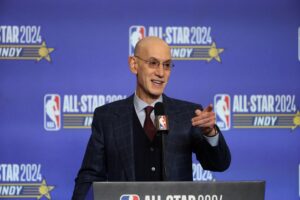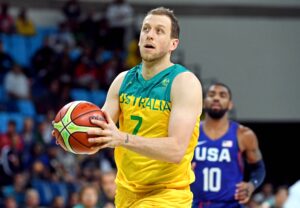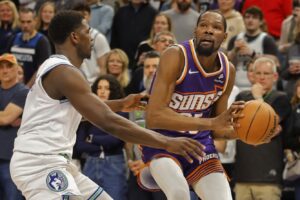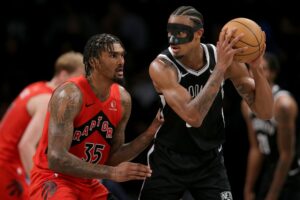With the start of July comes a changing NCAA landscape. For years now, we have heard about name, image, and likeness (NIL) rights for student-athletes. Essentially, this means athletes want the money that universities are making off of them. For example, an autograph from Luka Garza at an Iowa event would all go to Iowa. That will not be the case anymore.
There is no clear vision of how this will go. Most likely, there won’t be recognizable changes to the product that viewers experience. However, and most importantly, several players will have a much better experience. Additionally, as we are made aware of plater deals, we will update this article.
Name, Image, Likeness (NIL) Creates Brand New NCAA
Explaining Name, Image, Likeness
Name, image, likeness. What does it mean? It is the right of the player to profit off themselves. Basically, it means the university does not own things directly related to the player any longer.
Players have consistently raised concerns that they were unpaid employees of the NCAA. Whether it is a limit on food, resources, or outside influences, the NCAA players are kept in a closely monitored box. One false step can result in a lost season, like for James Wiseman who supposedly received “impermissible benefits” during a family move.
After a long fight, some players will now profit off of themselves. They can now make appearances, sign autographs, do commercials, and so much more for money. Interestingly, they can also accept goods as a trade for their service. Hello, car dealerships!
This is all happening now because of a hilarious United States Supreme Court ruling. While the ruling was not related to the NIL debate, it set a clear standard for the NCAA.
“Nowhere else in America can businesses get away with agreeing not to pay their workers a fair market rate on the theory that their product is defined by not paying their workers a fair market rate,” Justice Brett Kavanaugh said.
He even followed it up by saying “the NCAA is not above the law.” This statement reignited a push for pay-for-play, but that is another argument for another time. Let’s stick to what is actually happening right now.
July 1st Brings Necessary Change
In true NCAA fashion, Mark Emmert was hoping someone would save him. The NCAA Board of Directors and other leaders have been fighting to keep “amateurism” alive. Now that it is impossible, they caved. But, not entirely. Emmert says it is now up to the states to decide what to do with NIL. Where does that leave us? With seven states having actual NIL laws in place and several others having massive gray areas. Basically, everyone is operating under their own set of laws related to NIL issues.
Ultimately, the rules will start out as ensuring NIL deals do not directly influence recruitment. However, there are clearly certain schools that will do much better with exposure for NIL than others. The counterargument to that is going to a smaller school where you are the one and only attraction should create a pretty penny for athletes as well. Take Ja Morant and Zion Williamson. Both players would have made A LOT of money for themselves but took entirely different paths.
The biggest change will be to recruiting. Coaches will have to make concerted efforts to forecast a positive NIL experience for players. We have already seen several players post messages on their social media accounts saying they are open for business. Now, schools will be saying the same. Look for coaches to foster relationships with companies that will help all members of their team profit. Then, the higher-level players can look for other outside opportunities. A rising tide raises all boats.
Student-Athletes Cashing In
People are going to be shocked when July 1st hits and they hear about the numbers that are being thrown around for All-American type players from the biggest schools in college basketball. I’m hearing these deals will rival Overtime/G League Ignite type money for top guys. https://t.co/x8sW2b2vAu
— Jonathan Givony (@DraftExpress) June 28, 2021
*Updates will follow as deals are made public
Haley and Hanna Cavinder are TikTok celebrities and have gained social media stardom. They are dominant guards from Fresno State who are spending July 1st traveling to New York City for some appearances. They have inked deals with Boost Mobile and Six Star Nutrition.
Jordan Bohannon, a leader of this NIL movement, set up a Vidsig along with other Iowa teammates. This platform, much like Cameo (which Duke’s Mark Williams is on) will be the easiest path for athletes. Here, they can create personalized videos for fans for a fee.
Matthew Cleveland from Florida State has signed with Yoke Gaming. Several athletes will follow this path and be paid for their video gameplay. Over 4,000 NCAA athletes are reported to have deals with this group.
Bryce and Trey McGowens started a podcast sponsored by a bar in Lincoln. They will now be able to take full sponsorship money and profit off of this platform.
For monetary purposes, I will include D’Eriq King. King, the quarterback of the Miami Hurricanes signed a $20,000 sponsorship deal with a moving company.
Main Photo
Embed from Getty Images






